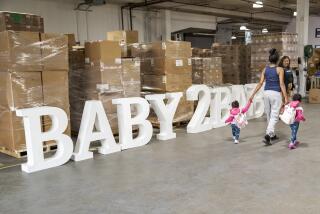2,000 Teddy Bears Held Hostage in Embargo Flap : War relief: Nurse collected toys for ill Iraqi children. U.S. detains them at LAX under terms of sanctions.
- Share via
Today is Day 14 of the teddy-bear hostage crisis.
Inside a warehouse at Los Angeles International Airport, more than 2,000 stuffed toy animals collected for Iraqi children remain in cardboard boxes, detained by U.S. Customs. Nearly a year after the liberation of Kuwait, the fate of these teddy bears is in limbo, awaiting the outcome of a dispute that pits a determined Santa Barbara nurse against the collective authority of the United States government and the United Nations.
The nurse, Dianne Judice, wants to send the secondhand toys to Iraq as part of a war relief shipment that also includes medicine, used blankets and children’s clothing.
No chance, U.S. Treasury Department officials have told Judice. The medicine can go, they say, but under terms of economic sanctions imposed against Iraq, the other merchandise cannot.
But Judice, who once specialized in pediatric nursing, argues that teddy bears are therapeutic for sick children.
“In every hospital in our country, you go in and you see children holding teddy bears,” she said. “They are medicinal because they provide comfort to sick and dying children. . . . Who are we trying to punish? The civilians and the children or Saddam Hussein?”
When she launched her “Teddy Bears for Iraq” campaign, Judice said she didn’t think the United Nations’ economic sanctions applied to toy animals. To her they seemed both a practical gift and a catchy symbol--a way of emphasizing the needs of children and setting her crusade apart from traditional relief efforts.
U.N. officials have made few exceptions to the embargo, which allows only the transport of humanitarian goods, such as medicine, food and equipment needed to repair sewage and water facilities. By embargoing everything else, the U.N. hopes to pressure Iraq into reforming its political system. Some exceptions are made on a case-by-case basis.
To relief workers trying to provide aid to Iraqi children, the teddy bear dispute is symbolic of policies that have exacerbated suffering since the war. Many civilians were killed and wounded and the destruction of plumbing and sewage systems left a legacy of rampant cholera, typhoid and malnutrition, humanitarian agencies say. The child mortality rate has doubled since the war’s end, said Jennifer Habte, a spokeswoman for Catholic Relief Services.
Catholic Relief, which has lobbied for relaxation of the embargo, has joined Judice in appealing to U.S. and United Nations officials to make an exception allowing the shipment safe passage.
Judice, 35, said she did not envision trouble when she launched her “Teddy Bears for Iraq” campaign with the help of a few friends last October.
Judice is not unacquainted with suffering. Eight years ago, her 2-year-old son died of leukemia. He was her only child.
“During the war, I’d weep daily for the mothers losing their children and the children losing their mothers,” Judice said. “It hit me hard.
She embarked on a solitary mission to Iraq last summer to witness the war’s impact. Judice, who is Jewish, said she traveled often with her parents to Israel and other parts of the Middle East while growing up, and had always had warm feelings for the Iraqi people. Shunning mainstream relief agencies, she entered the country with the help of an acquaintance who is a popular Iraqi entertainer.
She hired a driver and visited several cities. She was deeply disturbed by what she saw.
After returning home, she spoke in churches and mosques about her travels. Judice said she knew she wanted to return to Iraq to help the children. But she also knew she wanted to work outside relief agencies.
“There’s so much bureaucracy within those groups,” she explained. “On a deep, personal level, I wanted to help these children--to just take action and show people who are feeling helpless that, yes, one person can do a lot.”
The teddy bear scheme was still just an idea when Judice visited an art exhibit at an Alhambra studio featuring the wartime works of artist Hanaa al-Wardi, an Iraqi-American who immigrated with her husband to the United States 21 years ago. Al-Wardi titled her exhibit “Collateral Damage”--the U.S. military’s term for civilian casualties. Al-Wardi remembers how they wept together when Judice spoke of her travels to Iraq.
They resolved to make “Teddy Bears for Iraq” a reality. They held a press conference and put out flyers asking for teddy bears, Tylenol, aspirin and Band-Aids.
Donations came in from various parts of the country. One man gave $5,000 worth of medical supplies purchased wholesale from a pharmaceutical company. Another provided $576 in medicine. Al-Wardi was struck by the number of grandmothers who visited her studio, bringing their grandchildren’s old teddy bears and dolls.
Judice and al-Wardi stuffed the 1,100 pounds of goods into 63 boxes and delivered them by U-Haul to Alitalia Airlines on Jan. 29. Judice intended to depart a day later, to meet representatives of the Jordan Red Crescent Society--the Islamic equivalent of the Red Cross--and deliver the supplies to Iraq.
Then the relief mission stalled.
An alert customs inspector, noting that Amman is a typical stop for goods bound for Iraq, flagged the shipment. Questioned by the inspector the next morning, Judice acknowledged that the ultimate destination was Iraq and explained she had marked Amman because, after all, that is where the flight was going. She said she did not realize she needed a license from the Treasury Department’s Office of Foreign Assets to ship relief supplies to Iraq.
The inspector seemed stumped by the teddies. “He said, ‘I’ve never dealt with anything like this. I have to make some calls.” ’
Customs officials helped guide her through the bureaucracy. Judice said she believed the snag was all a matter of paperwork until she telephoned Steve Pinter, assistant director of the Office of Foreign Assets. Pinter informed her that the teddy bears could not be shipped, even suggesting that the next person who wanted an exception would send nerve gas or nuclear weapons.
Attempts to reach Pinter were not successful. “We can’t comment on a specific case,” said Barbara Clay, a spokeswoman for the Treasury Department. “But the export of goods to Iraq, including humanitarian goods, requires a license.”
Russell Graham, a deputy counsel to the U.S. delegation at the United Nations, said that even if U.S. officials endorsed teddy bears for Iraq, “I’m not sure that other members of the sanctions committee would allow toys to go. . . .”
“The problem,” Graham said, “would be the precedent they would set.”
More to Read
Sign up for Essential California
The most important California stories and recommendations in your inbox every morning.
You may occasionally receive promotional content from the Los Angeles Times.










